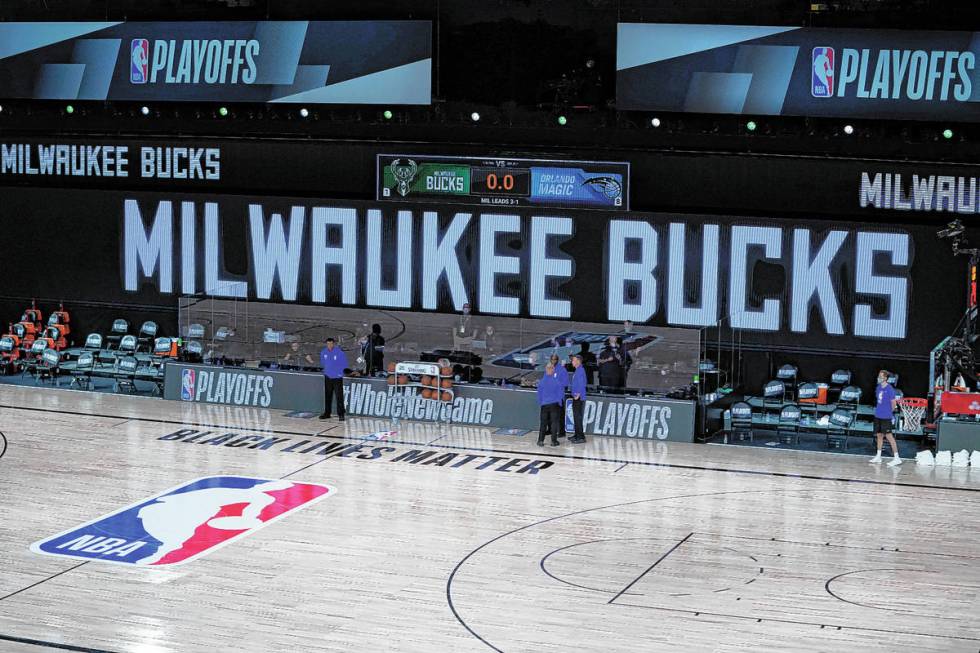VICTOR JOECKS: The NBA’s Jacob Blake boycott accomplished nothing

Rarely has an effort garnered so much praise for accomplishing so little. That’s a fitting epitaph for the 2020 sports strike.
Less than two weeks ago, the Milwaukee Bucks refused to take the floor for a playoff game. The boycott was to protest a Wisconsin police officer shooting Jacob Blake, an African American, in the back. A viral video of part of the encounter fueled the flames. The other NBA teams scheduled to play that day joined the Bucks. Several baseball and hockey teams, including the NHL’s Vegas Golden Knights, later followed suit.
ESPN praised it as a “historic week.” Athletes “took their boldest stand yet against systemic racism and police brutality,” The New York Times reported. “NBA players are poised to shape the conversation — and perhaps even influence the upcoming election,” Axios wrote.
The NBA players succeeded in bringing much of the sports world to a standstill. But they didn’t have a clue what to do next.
The NBA and other sports leagues don’t have the authority to bring criminal charges. That’s good. Criminal charges should stem from police investigations, not the whims of celebrities.
Then there was the fact that league revenue drives player pay. Union officials explained that a sustained boycott could result in salary reductions of 25 to 30 percent next year, ESPN reported.
Emotion gave way to reality. Sports resumed just as the Blake shooting narrative was unraveling.
The Blake family’s attorney initially said his client was trying to break up a fight between two women. The implication was that a white cop shot a black man who was trying to be a good citizen.
Except that’s not true. Blake was at the house of a woman he allegedly sexually assaulted in May, according to the New York Post. She called the cops, complaining that Blake was trying to steal her keys. Those officers knew Blake had an active arrest warrant before they arrived on the scene, according to a statement put out by the Kenosha Professional Police Association. The officers attempted to arrest Blake, but he resisted, even putting one of them in a headlock. Two officers deployed tasers. Blake broke away anyway.
Blake acknowledged having a knife in his possession, according to an investigation by the Wisconsin Department of Justice. The KPPA said he had the knife when he struggled with officers. Are officers now supposed to let armed suspects flee if they resist arrest?
Don’t expect NBA players to grapple with these new details. They’re convinced that police officers are actively looking to murder Black people. “You have no idea how that cop that day left the house … maybe he just left the house saying that today is going to be the end for one of these Black people,” LeBron James said in response to Blake’s shooting.
There’s yet to be any evidence that Blake’s shooting was racially motivated.
There are 44 million Black people in America. Police shot 14 unarmed Black people last year, according to The Washington Post. Some of those shooting were justified. In one case, police shot a 17-year-old after he punched an officer and reached for his gun, according to The Oklahoman.
The first step to solving problems is being honest about what’s happening. Unfortunately, the most vocal NBA players aren’t willing to do that either in this situation or regarding the police as a whole.
That’s one reason the sports boycott of 2020 will more likely become an afterthought instead of a turning point.
Victor Joecks’ column appears in the Opinion section each Sunday, Wednesday and Friday. Listen to him discuss his columns each Monday at 3 p.m. with Kevin Wall on AM 670 KMZQ Right Talk. Contact him at vjoecks@reviewjournal.com or 702-383-4698. Follow @victorjoecks on Twitter.